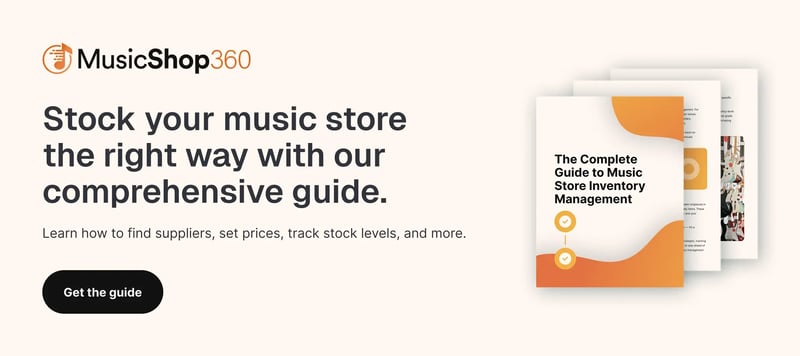
We all know that running a music store is a passion project — but it’s also a business. And in the modern online retail marketplace, having the right music store point of sale (POS) system makes all the difference between hitting the right notes and falling flat.
A good POS system isn’t just about ringing up sales — it’s about making your job easy, keeping your inventory in tune, and providing your customers with a rockin’ experience. But with so many options out there, how do you find the perfect fit for your music store?
Luckily, we put together a list highlighting the must-have features to look for in a music store POS system and the top five POS providers. From inventory management that keeps your stock in harmony to user-friendly interfaces that even a beginner can jam with, we’ll cover it all.
Let’s get started.
Must-Have Music Store Point of Sale Features
The best music store point of sale systems include the following features in their software.
User-Friendly Interface
A POS system that’s difficult to use only causes stress for you and your team. Look for a system that prioritizes user experience and simplifies your processes.
Your POS system needs:
- Accessible interface: Use a system that’s intuitive and easy to navigate to minimize the learning curve and to allow you to focus on your customers.
- Comprehensive support: Ensure the POS provider offers reliable and timely customer support to resolve any issues that may come up.
With a user-friendly POS system and strong support, you spend less time troubleshooting and more time running your business.
Reporting and Analytics
Informed business decisions are based on data. For your music store, reporting and analytics help you understand sales data, customer behavior, and inventory status. Comprehensive reporting and analytics tools turn raw data into actionable strategies.
Features to look out for include:
- Sales performance reports: Analyze sales data over various time frames to identify trends and make data-driven decisions.
- Customer insights: Gain a deeper understanding of customer buying habits to tailor your inventory and marketing efforts to better meet customers’ needs.
These tools level up your music store, from inventory management to marketing strategies. Data insights allow you to stay ahead and ensure your business remains profitable.
Repair and Service Management
Offering repair and maintenance services adds significant value to your music store, which sets you apart as a full-service destination for your customers.
To efficiently manage these services, it’s important to have a POS system with features like:
- Work order tracking: Manage repair orders from intake to completion, while keeping customers informed throughout the process.
- Service scheduling: Organize repairs and maintenance services to distribute resources properly and manage staff time effectively.
By integrating these features into your POS system, you simplify service management and deliver a seamless experience for customers. This establishes your music store as a reliable source for both instrument sales and repair services.
Related Read: Musical Instrument Repair: Top Tips and Tools for Managing Repairs
Instrument and Equipment Rentals
A POS system that has rental management features simplifies the process. This makes it easier for dealers to manage their rental inventory and serve their customers.
Key POS features for school music dealers include:
- Instrument & equipment tracking: Track the availability and condition of rental instruments and equipment to make sure you have the right inventory on hand to meet students’ needs.
- Rental agreements & contracts: Get templates for rental agreements and contracts, making it easy for you to create and manage rental transactions.
- Student & parent portals: Let students and parents view their rental history, make payments, and communicate with you about their rental needs.
- School purchase orders: Process school purchase orders, allowing you to collaborate with schools and provide rental services to students.
- Integration with music lesson software: Integrate with music education software to allow you to share student and instructor information, scheduling, and communication features between teachers and students.
By implementing a POS system with these features, school music dealers deliver a comprehensive instrument and equipment rental service that meets the needs of students, parents, and schools.
Marketing Tools
Integrated marketing tools within your POS system transform how you interact and connect with your customers — allowing you to attract new business and stay engaged with existing customers.
With these tools, you can take advantage of:
- Email & SMS marketing: Create personalized messages about new products, promotions, or events, and send them directly from your POS system.
- Promotional campaigns: Design and manage campaigns to attract customers to your store, using both online and offline strategies.
These marketing tools give you the opportunity to excite and inform your customers about events and promotions at your music store, ranging from sales on new instruments to discounts on lessons.
Related Read: How To Market a Music Store: 7 Steps to Success
E-Commerce Integration
Your music store reaches a wider audience and offers customers the convenience of online shopping by integrating an e-commerce platform. This online presence is more critical now than ever. It’s important to connect your in-store operations with your online sales to create a seamless shopping experience for your customers.
Key features include:
- Real-time integration: Sync inventory and sales data across online and physical channels to ensure accurate stock levels and a consistent customer experience.
- Unified shopping experience: Allow customers to browse, purchase, and even schedule services (like music lessons) online.
These features let you accurately track sales from all channels, improve efficiency, expand your market reach, and meet your customers’ needs.
Loyalty Programs
Loyalty programs are a powerful tool for music stores to foster strong customer relationships. By understanding customer preferences and rewarding their loyalty, you transform occasional customers into devoted patrons.
With loyalty programs, you can offer:
- Rewards & referral bonuses: Give reward points and encourage your loyal customers to refer friends and family by offering referral bonuses. For each new customer they bring in, reward both the referrer and the new customer with points, discounts, or store credit. This not only helps grow your customer base, but strengthens the bond with existing customers, too.
- Loyalty cards & special event promotions: Host exclusive events for loyalty program members, like private in-store concerts, early access to new product launches, or special workshops with musicians. These events create a sense of exclusivity and make your customers feel appreciated, which encourages them to keep coming back to your music store.
Implement a rewarding loyalty program and you’ll see a boost to the bottom line.
CRM Systems
A customer relationship management (CRM) system lets you personalize and monitor customer interactions and purchase history. This data allows you to enhance customer service and create a more personalized shopping experience.
Main features of a CRM system include:
- Customer tracking & history: Maintain comprehensive records of customer purchases and preferences to customize recommendations and communications.
- Loyalty programs & scheduled promotions: Implement loyalty programs that offer rewards to incentivize repeat business and demonstrate appreciation for customer loyalty.
Remember: Your customers are essential to the success of your music store. By meeting their needs and giving them a tailored shopping experience, you develop a strong customer base that drives your business forward.
Flexible Payment Options
To ensure a fast and easy checkout process that caters to all customer preferences, your POS system needs to support a variety of payment methods, from credit cards to digital wallets.
Key features of flexible payment options include:
- Multiple payment methods: Accept credit cards, debit cards, mobile payments (like Apple Pay and Google Pay), and contactless transactions.
- Integrated payment processing: Sync transactions with your sales data to reduce manual entry errors and streamline accounting.
A POS system that integrates with your payment processing system keeps all your sales and inventory data in one place.
Integrated Inventory Management
Inventory management is essential for music stores to avoid stockouts and missed sales. An integrated system offers features like unlimited SKUs, serial number tracking, and vendor management to simplify ordering.
Integrated inventory management features include:
- Real-time tracking: Monitor stock levels across all sales channels to ensure accurate, up-to-date inventory and prevent stockouts of popular items.
- Automated inventory processes: Streamline inventory management by cutting back on manual tasks and human error to save time and do more.
With inventory management running smoothly, you can focus on other aspects of your business — like finding the perfect guitar for your customers.
Related Read: Music Store Inventory Management: 5 Best Practices
Top 5 Music Store POS Providers
Now, let’s explore the top five music store POS providers to help you choose the best solution for your business.
5. Shopify
Shopify is a mobile-friendly POS solution with strong e-commerce capabilities. It’s particularly beneficial for music stores that need a comprehensive system to manage musical instruments, both in store and online.
Features:
- Omnichannel sales capabilities
- Strong online store integration
- Mobile-friendly design
- Employee performance tracking
Pricing:
- Basic: $29 per month
- Shopify: $79 per month
- Advanced: $299 per month
- Plus: $2,300 per month
4. Lightspeed
Lightspeed is a POS system made for a wide range of business types, including music stores. It’s known for its advanced inventory management and omnichannel capabilities. Lightspeed is well-suited for large, established retailers with multiple locations.
Features:
- Omnichannel sales capabilities
- Advanced inventory management
- Customization and CRM
- Comprehensive data reporting
- Integrated purchase orders
Pricing:
- Basic: $89 per month
- Core: $149 per month
- Plus: $289 per month
- Custom options are available for larger businesses, with hardware sold separately.
3. Square
Square is a user-friendly point of sale solution with e-commerce capabilities. It’s suitable for businesses of all sizes and offers seamless payment processing. Square is a good option for start-ups and small businesses that don’t need industry-specific features.
Features:
- Seamless payment processing
- E-commerce capabilities
- Multiple hardware options
Pricing:
- Free Plan: Basic features for small businesses
- Plus: $29 per month for advanced features
- Premium: Custom pricing
2. AIM by Tri-Tech
AIM by Tri-Tech is a music instrument management system with POS, inventory management, accounting, and customizable business modules. It’s a good fit for retailers who need advanced features to improve operational efficiency and customer service.
Features:
- Comprehensive rental management
- Detailed inventory control
- POS and accounting integration
- Class scheduling and billing
- Service and repair tracking
- Marketing and customer management
Pricing:
Custom pricing is available upon request.
1. Music Shop 360
Music Shop 360 is a cloud-based music store point of sale system designed specifically for music store owners. It combines industry-specific and general retail features to help main-street music retailers simplify their business and boost customer engagement.
Features:
- Integrated inventory and rental management
- Class scheduling and billing
- Service and repair tracking
- CRM tools
- E-commerce integration
- Text and email marketing tools
- Data migration and onboarding
- Seamless integrations with platforms like Reverb and My Music Staff
- Unlimited training and customer support
Pricing:
Music Shop 360 offers customizable pricing plans with no hidden fees.
Make Music Shop 360 Your Music Store Point of Sale
Music Shop 360 is the ideal music store POS system for businesses looking to simplify their day-to-day tasks and boost sales.
With features like inventory management, loyalty programs, marketing tools, and seamless payment processing, Music Shop 360 offers a comprehensive solution that caters to the unique needs of music retailers.
Our all-in-one POS is user-friendly and designed to make it easy for your staff to learn and use the system, so they can focus on providing exceptional customer service.
Ready to learn more? Schedule a demo today to experience how Music Shop 360 can transform your music store.








 by Taylor Harnois
by Taylor Harnois

![4 Music Store Inventory Management Challenges [+ Solutions]](https://musicshop360.com/hs-fs/hubfs/_Blog/Blog%20Featured%20Images/Music%20Shop%20360/1%2029%204%20Music%20Store%20Inventory%20Mangement%20Challenges%20%5BBLOG%5D.webp?width=520&height=294&name=1%2029%204%20Music%20Store%20Inventory%20Mangement%20Challenges%20%5BBLOG%5D.webp)
